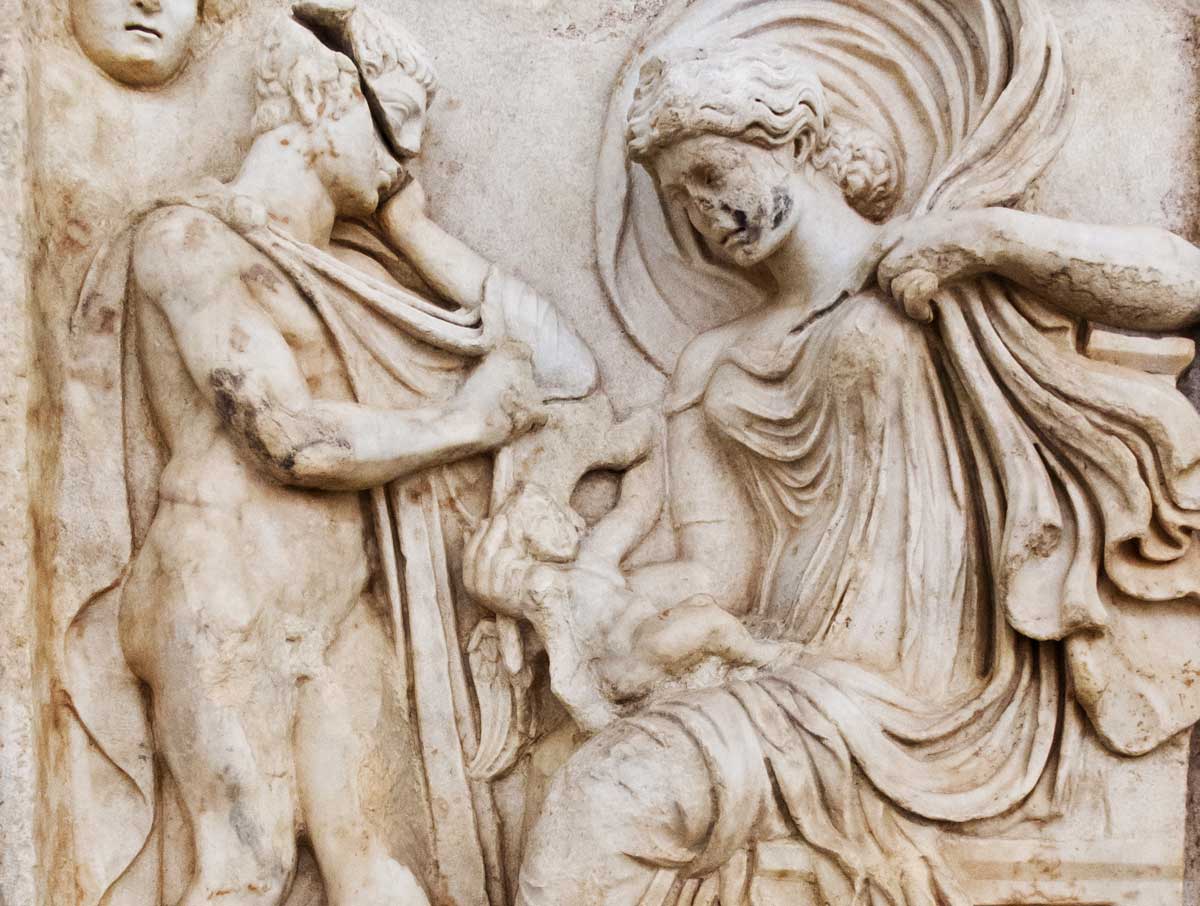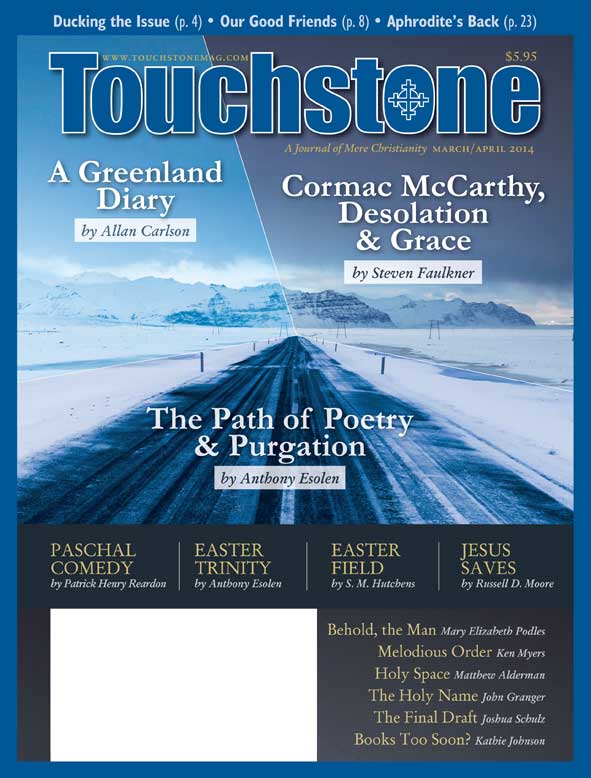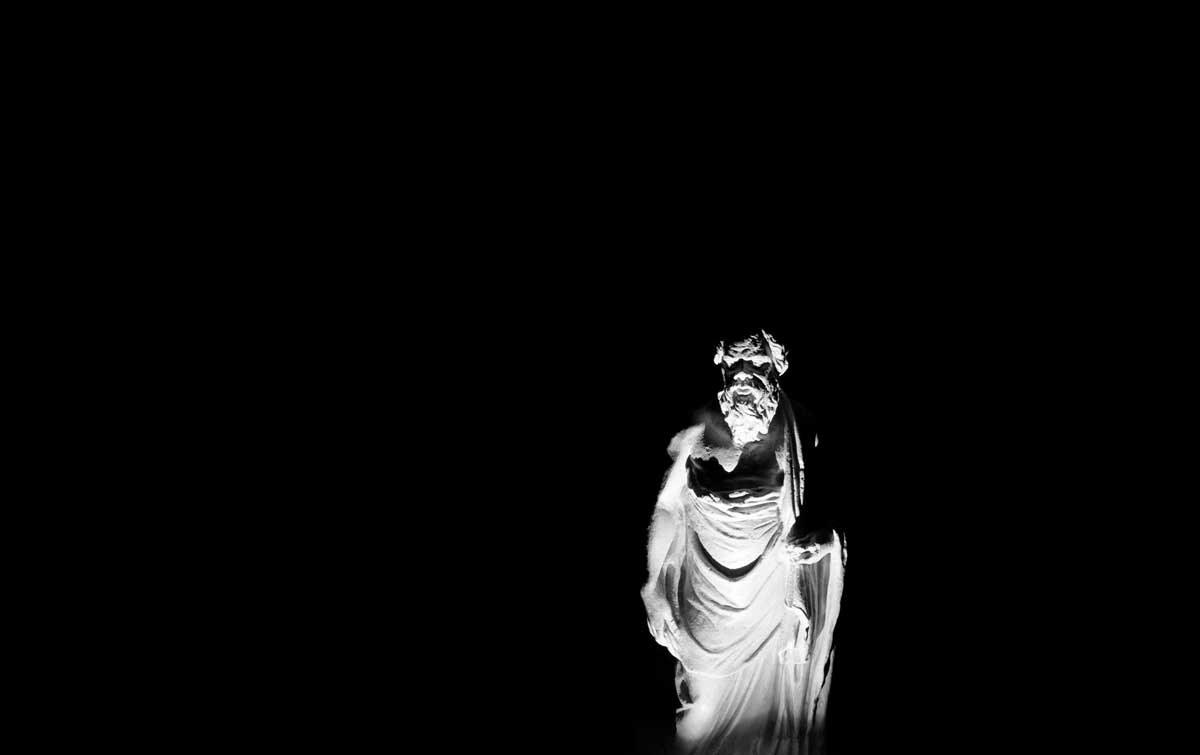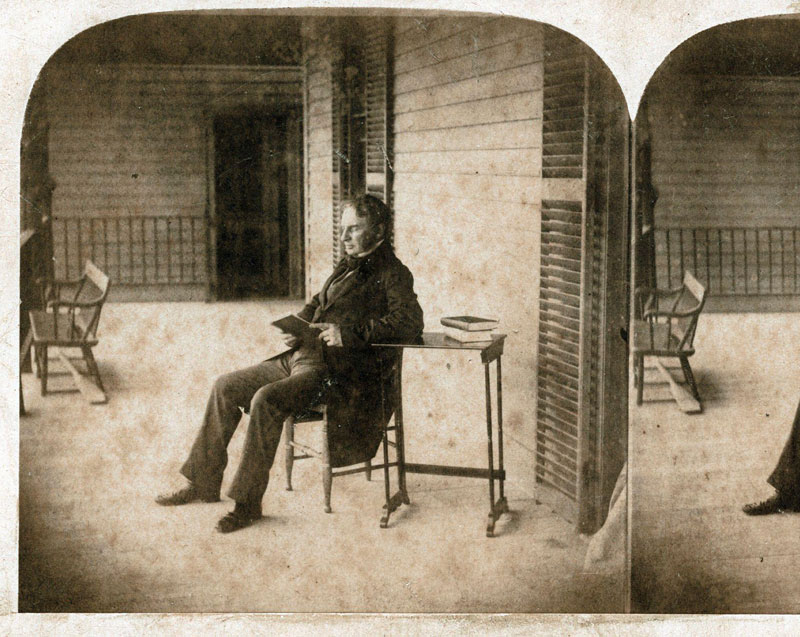VIEW
The Rights of Aphrodite
W. E. Knickerbocker on C. S. Lewis & the New State Paganism
In the essay "We Have No 'Right To Happiness,'" C. S. Lewis tells his readers of a conversation he had with a woman who was one of his neighbors. The subject of the discussion was two neighbor couples, Mr. and Mrs. A and Mr. and Mrs. B. Mr. A had divorced Mrs. A to marry Mrs. B, who had divorced Mr. B. Mrs. A's looks were not what they once were, one cause of which was the number of children she had borne to Mr. A. Mr. B had been disabled in the war and was out of a job. The neighbor with whom Lewis was having the conversation justified these divorces and the remarriage by saying that Mr. A and Mrs. B "had a right to happiness."
Lewis says the neighbor who justified this behavior was "rather leftist" in her politics and a teetotaler, who would certainly not approve of a ruthless businessman whose happiness consisted in making money or of an alcoholic who was happy when he was drunk. Rather, the happiness to which this neighbor said Mr. A and Mrs. B had a right was solely "sexual happiness." The right to sexual happiness justified breaking vows solemnly made and legally validated.
In the course of this essay, Lewis refers, as he often does in other writings, to natural law, which he sometimes calls the Law of Human Behavior (Mere Christianity, ch. 1). He goes into greater detail about this law in The Abolition of Man, there contending that it has been proclaimed in various ways by all the great religions and philosophies. All of them recognize that our ability to know how we should behave is greater than our ability to behave as we should, but, he argues, this is no excuse for discounting the natural law, which is accessible to all people—what St. Paul calls the law written on the hearts and consciences of the Gentiles (Rom. 2:14–15).
In a direct reference to American culture, Lewis cites the Declaration of Independence and its statement about "the pursuit of happiness." He then says,
And now we get to the real point. What did the writers of that august declaration mean? It is quite certain what they did not mean. They did not mean that man was entitled to pursue happiness by any and every means—including, say, murder, rape, robbery, treason and fraud. No society could be built on such a basis. They meant "to pursue happiness by lawful means"; that is, by all means which the Law of Nature eternally sanctions and which the laws of the nation shall sanction.
In modern culture, however, this law of nature is disregarded precisely with respect to the issue with which Lewis introduced his essay—the issue of sexual happiness.

Goddess of the New Paganism
It is here that we begin to see the nature of the new paganism. Like any paganism, it has its pantheon of gods and goddesses. At the top of its pantheon is a modern version of Aphrodite, the Greek goddess of love, who has become here a goddess of sex. She gives her Greek name to the aphrodisiacs so prevalent in our culture, and her Roman name, Venus, to the diseases that are prevalent among her worshipers—or at least she did before venereal afflictions became euphemized as STDs.
She has also succeeded in banishing Hymen, the god of marriage, to the periphery of our culture. She has enlisted Mars, the god of war, in her service, but has tamed him to become simply a god of violence, including emotional violence. The emotional experience of violence can both precede and follow the emotional experience of the sex act, especially when that act is a violation of the natural law indelibly imprinted on the conscience.
This Aphrodite is especially pleased by rape. Any form of the sex act will do, however, as long as it is done out of wedlock, because any such act constitutes worship of her: fornication, adultery, sodomy, lesbianism, bisexualism. Like any god or goddess, she demands her sacrifices, and gets them: babies, especially those not yet born (she encourages abortion and embryonic stem-cell research); the disabled and elderly who can no longer worship her in the way she demands; marriages (she favors "no fault" divorce), families (she likes children to have no father or mother present, or to be shuttled back and forth between divorced parents), physical health (she likes all varieties of STD), and psychological health (she thrives on heartache and is gleeful over drug and alcohol abuse and suicides).
She rejoices over the sacrifice of gender in transgenderism. She tempts people to believe that the order of God can be made to conform to the disorder within them. Her seductiveness permeates television, movies, the print media, billboards, social media, and pornographic sites on the internet. She wants her devotees to mistake love with the desire to be loved, and to embrace erotic love as the only kind of love, separating it from storge, philia, and agape (see Lewis's The Four Loves), and letting it consume one's entire life. Her followers continually hear her whisper seductively, "I know I haven't really delivered what I promised before, but it will be different next time; just try me again."
Government Replacing God
And even this is not the full extent of the power of this paganism in today's culture. In his essay, "Willing Slaves of the Welfare State," Lewis gives us a picture of the contemporary nation-state that has become the final authority in determining good and evil, right and wrong, truth and falsehood. In this picture, political leaders are allied with scientists, especially social scientists, in their desire to control every facet of human life. As Lewis writes, "Let us not be deceived by phrases about 'Man taking charge of his own destiny'. All that can really happen is that some men will take charge of the destiny of the others. . . . The more completely we are planned, the more powerful they will be." And, as numerous instances attest, power will corrupt. Lewis presents us with a full working out of this picture in his depiction of N.I.C.E. in That Hideous Strength.
At this point in the history of the United States, those in power have decided to establish this paganism as the state religion, and they have done it with the consent of some of the people and because of the ignorance of others. The First Amendment of the Constitution is frequently referenced with regard to its guarantee that Congress shall make no law prohibiting the "free exercise of religion." We should also remember, however, that the first part of that Amendment says, "Congress shall make no law respecting the establishment of religion."
With the adoption of the Affordable Care Act (ACA) and its interpretation by the executive branch, the Obama administration, with cooperation from Congress, has effectively established the new paganism as the religion of the land. Under its interpretation of the ACA, the executive branch has required employers to provide health insurance that includes contraceptives, abortifacient drugs, and sterilization, a requirement that violates the conscience of many Christians. In other words, the government has declared that it has the right to determine good and evil, right and wrong, truth and falsehood. The ACA and its regulations continue the precedent set in the 1973 Supreme Court decision that made the "right" to abortion the law of the land.
We can see here an analogy to the requirement of the ancient Roman government to burn incense before the statue of the emperor as a public way of acknowledging that he was the final authority in determining good and evil, right and wrong, truth and falsehood. We are being forced to follow a state-mandated paganism, to render to Caesar the things that are God's (Matt. 22:21). This is in direct violation not only of clear Christian teaching but also of the natural law, which Lewis recognizes as the basis of our Declaration of Independence.
Prisoners' False & True Stories
I am a Catholic parish priest in a small Texas town. It is late on a Wednesday afternoon, and I have been visiting prisoners in the county jail. The door to the cellblock slams behind me, and I walk down the hall toward the security door. I think of the stories the prisoners have told me of their lives and how those stories led them here.
I think of the men who have committed sex crimes. Some of them are repentant, but others try to justify what they have done. When they tell me their stories, I remember Aslan in The Horse and His Boy, saying to Shasta and Aravis on separate occasions, "I never tell anybody any story but his own." This is a commentary by Lewis on the story of the Woman at the Well in John 4, where the woman speaks of Jesus to her friends and says, "Come, see a man who told me all I ever did" (4:29).
But the prisoners who try to justify what they have done do not tell me the stories of their lives as Jesus would have told their stories to them. Each one tries to spin a tale that justifies his crime, and why shouldn't he? After all, our culture is awash with toleration, even encouragement, of every kind of sexual expression. When one of these prisoners talks, I remember that Satan is called the "father of lies," and that, following him, the prisoner is giving me a false picture of himself, a self never intended by God. I see Aphrodite working her dark charms to ensnare him. She has begotten, in Lewis's words in The Abolition of Man, a man without a chest, a man whose virtues are so atrophied that his belly controls his head. I begin to see Aphrodite unmasked, and it frightens me. She is Screwtape transgendered.
Is the prisoner at the point reached by Weston in Perelandra, where he is possessed by the devil? I remember Lewis's sermon on "The Weight of Glory," in which he reminds us that
There are no ordinary people. You have never talked to a mere mortal. Nations, cultures, arts, civilizations—these are mortal, and their life is to ours as the life of a gnat. But it is immortals whom we joke with, work with, marry, snub, and exploit—immortal horrors or everlasting splendors.
I also remember Lewis saying in Mere Christianity that "the clergy are those particular people within the whole Church who have been specially trained and set aside to look after what concerns us as creatures who are going to live forever." How am I to help these men escape the horror of hell?
Thanksgiving & a Petition
As I turn right at the end of the hall to tell the deputy sheriff I am finished, I think of the new paganism and how the government of this country has made it the established religion of our land. Jesus said that the gates of hell would not prevail against his Church, but he did not say that about the United States of America. There will be a day when America is no more, but the prisoners with whom I talk will live forever, either as immortal horrors or everlasting splendors. I am thankful I can witness to Christ and pray with them.
And I am thankful that these men can still repent and be forgiven, for it means I can be forgiven, too. As a Catholic priest, I have a responsibility for these men. And I know I must not succumb to anger against an American government and culture that contributes to the wreckage of human lives. I think of the N.I.C.E. in That Hideous Strength and how the majority of its members thought they were going to rule over other people and re-make the world through science, when the real ruler of the N.I.C.E. was Satan himself.
When I step out the back door of the jail, I turn west to walk to the parking area. I look at the sky and see the promise of a beautiful sunset, not unusual in this part of Texas. I remember Lewis's pictures of the real Narnia in The Last Battle, Narnia as it should have been all the time, when the children and the talking animals are going "further up and further in." The scene and the remembrance of Narnia wash my soul. I have been face-to-face with the American wraith of Aphrodite and her paganism, a paganism that is all lies from the father of lies. I realize once again that the myth that Lewis created in the Chronicles of Narnia is close to what he calls the true myth of Jesus Christ, in whom myth has become fact. I remember Sarah Smith of Golders Green in The Great Divorce, that great lady in heaven who was known by so few on earth, a great lady because of who she is in Christ.
As I walk to my car, I am filled with thankfulness for my family and all the good people in this Texas town—the parishioners of our Catholic church and the other Christian communities, my colleagues in the Ministerial Alliance, the school administrators and teachers, the folks at the county courthouse, the various businesses in town, the nursing home, and the hospital. They all encounter this new paganism, and many do their best to oppose it. So I end this paper with a petition, one that I can make as a Catholic: Jack Lewis, pray for us. •
An earlier version of this article was presented at the "Christianity in the Academy Conference" in Memphis in March 2013.
W. E. Knickerbocker taught Church History and Spiritual Theology at Memphis Theological Seminary for 32 years. He was ordained a Roman Catholic priest under the Pastoral Provision in 2009 and now serves at St. Theresa Catholic Church in Junction, Texas.
subscription options
Order
Print/Online Subscription

Get six issues (one year) of Touchstone PLUS full online access including pdf downloads for only $39.95. That's only $3.34 per month!
Order
Online Only
Subscription

Get a one-year full-access subscription to the Touchstone online archives for only $19.95. That's only $1.66 per month!
bulk subscriptions
Order Touchstone subscriptions in bulk and save $10 per sub! Each subscription includes 6 issues of Touchstone plus full online access to touchstonemag.com—including archives, videos, and pdf downloads of recent issues for only $29.95 each! Great for churches or study groups.
Transactions will be processed on a secure server.
more on abortion from the online archives
more from the online archives
calling all readers
Please Donate
"There are magazines worth reading but few worth saving . . . Touchstone is just such a magazine."
—Alice von Hildebrand
"Here we do not concede one square millimeter of territory to falsehood, folly, contemporary sentimentality, or fashion. We speak the truth, and let God be our judge. . . . Touchstone is the one committedly Christian conservative journal."
—Anthony Esolen, Touchstone senior editor













